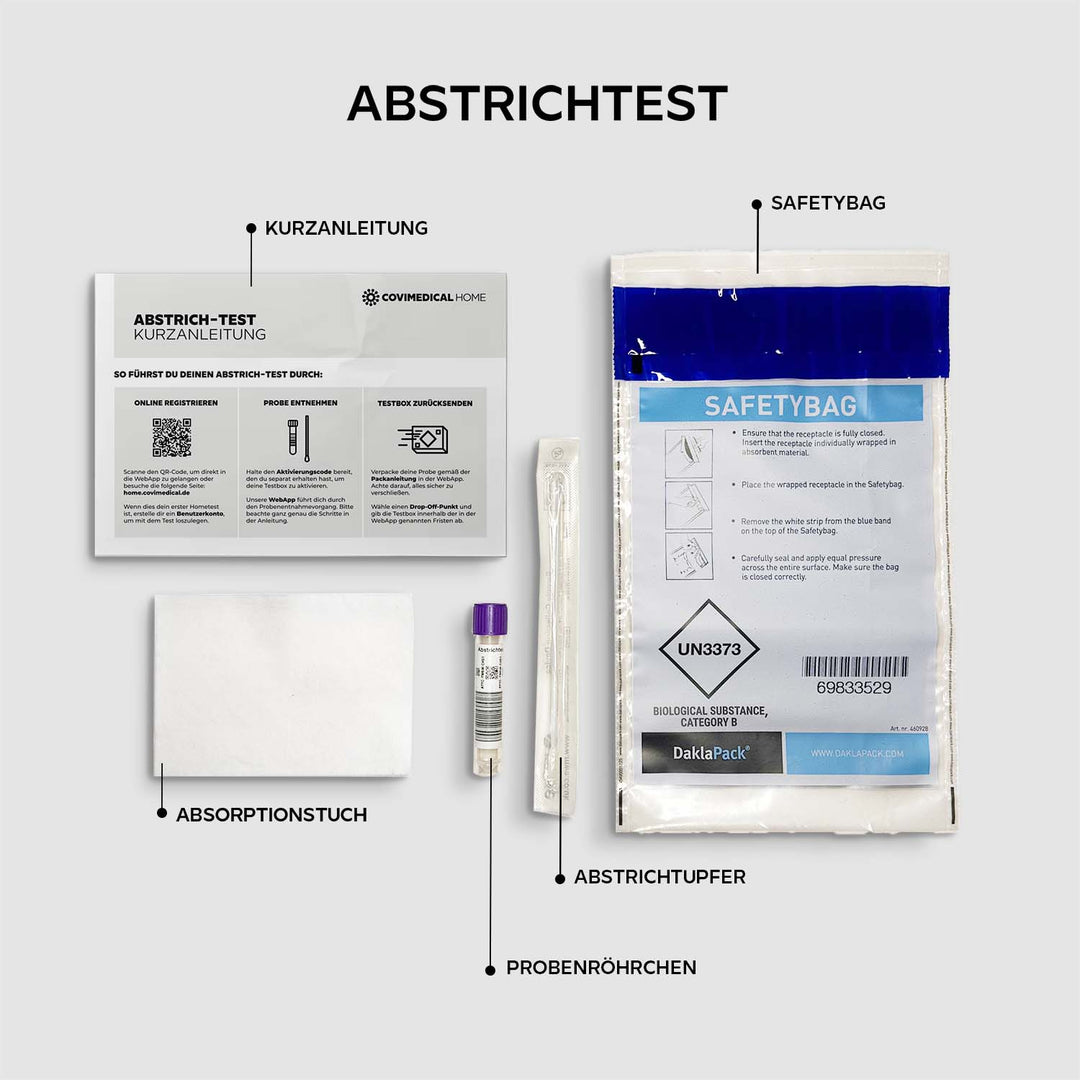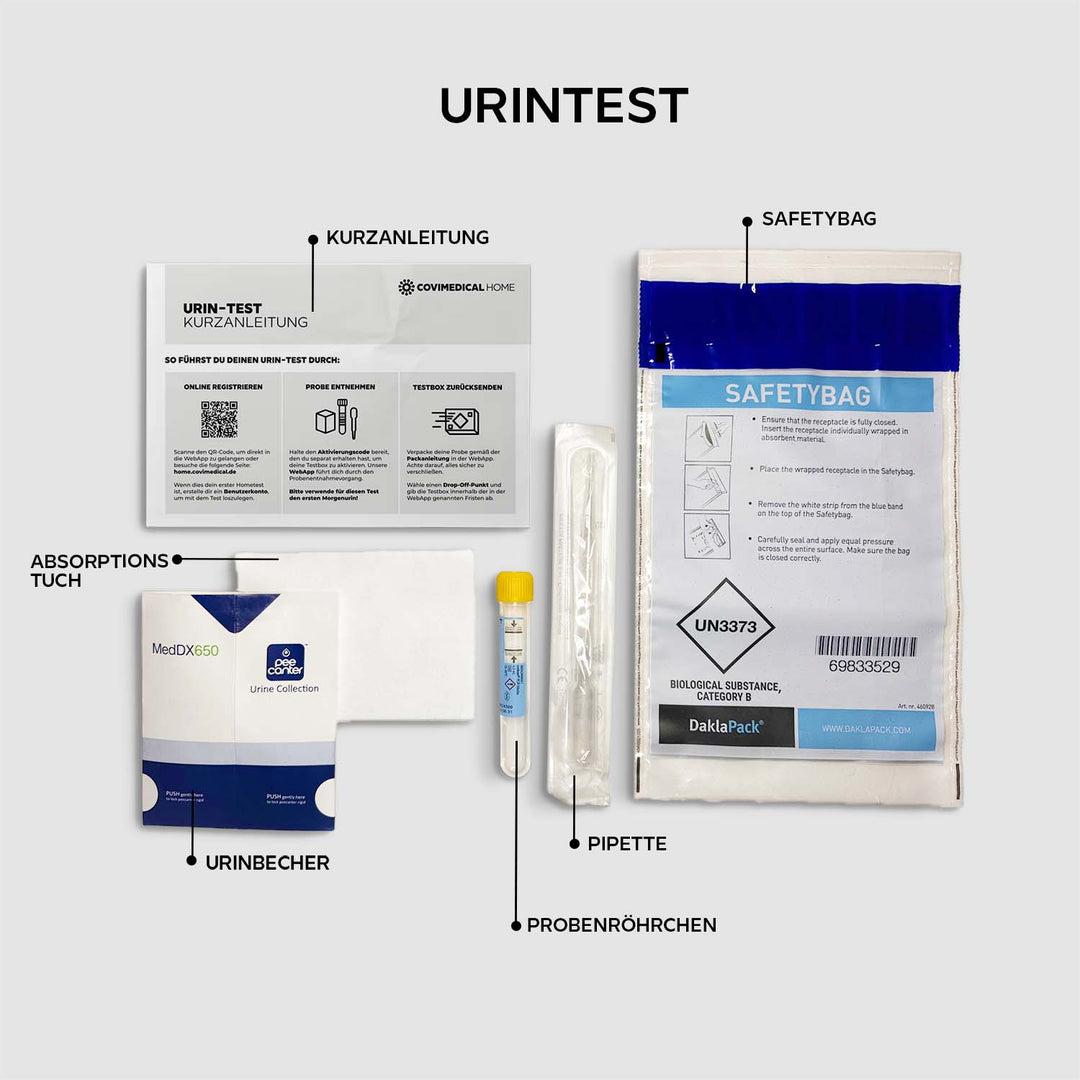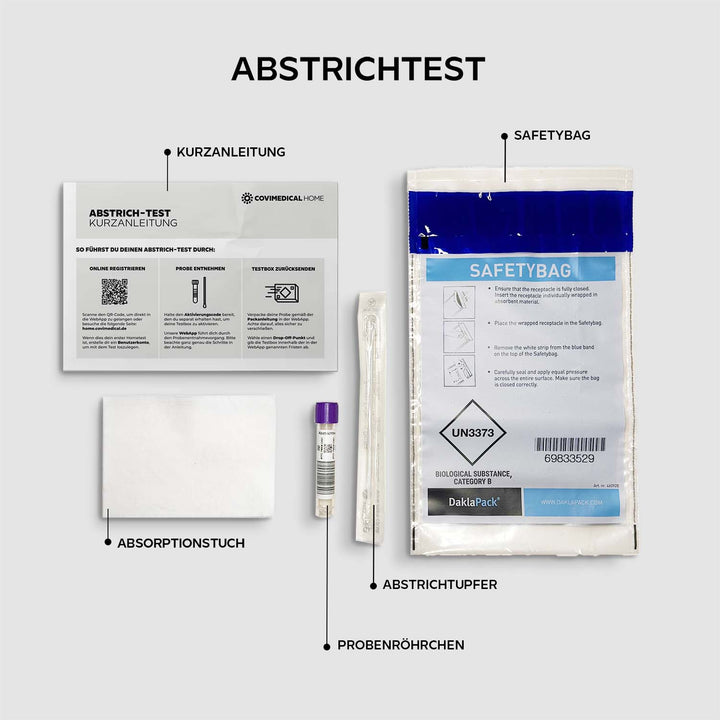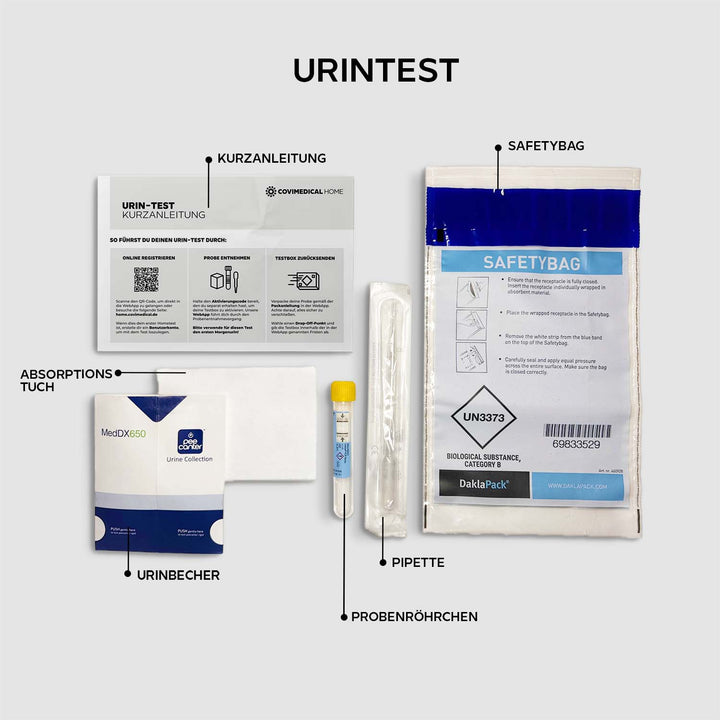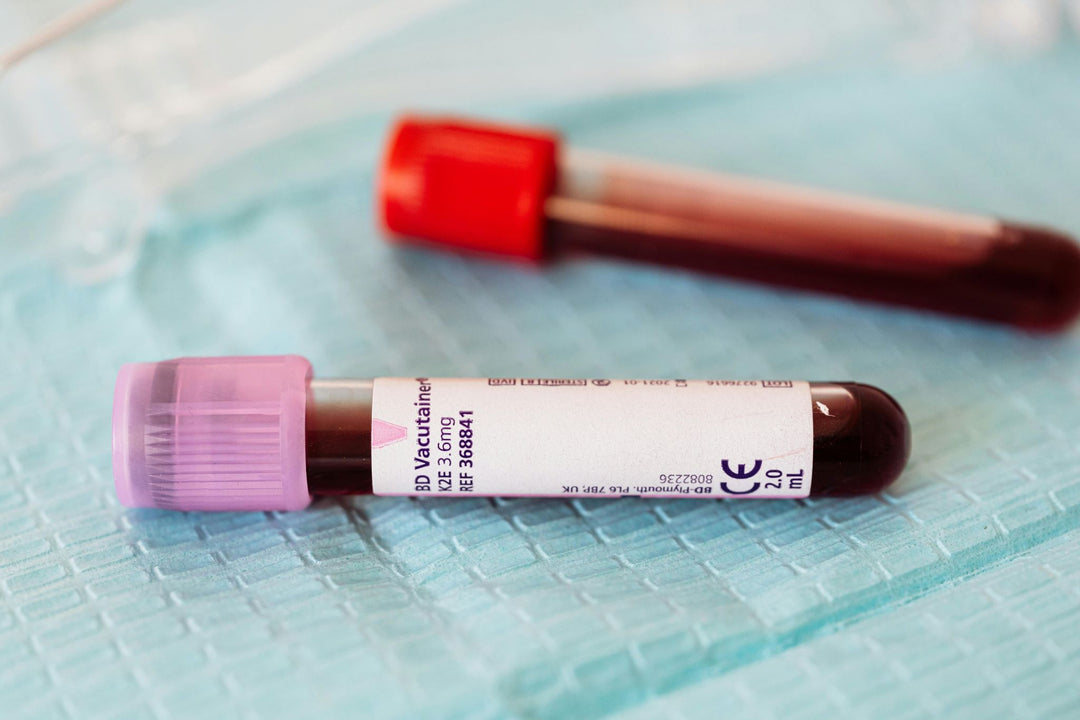With this test, your sample will be examined for 3 different STI pathogens:
Chlamydia
What are Chlamydia?
- Chlamydia is a type of bacteria that can be sexually transmitted and is among the most common sexually transmitted infections. It affects both men and women and can lead to various health problems if not treated promptly.
How are Chlamydia transmitted?
- Chlamydia is primarily transmitted through unprotected sexual intercourse (vaginal, anal, or oral) with an infected person. The infection can also be passed from an infected mother to her newborn during childbirth.
What symptoms do Chlamydia cause?
- It's important to note that Chlamydia often presents asymptomatically, with affected individuals showing no obvious signs of infection. However, the following symptoms may occur:
In Men:
- Discharge from the urethra
- Swelling or pain in the testicular area (rare)
- Burning or pain during urination
In Women:
- Pain during urination
- Vaginal discharge (unusual amount, color, or odor)
- Spotting or abnormal menstruation
- Lower abdominal pain or pressure
What complications can arise if Chlamydia goes untreated?
Untreated Chlamydia infections can have serious consequences, including:
- In Men: Inflammation of the epididymis and prostate, as well as an increased likelihood of infertility.
- In Women: Pelvic inflammatory disease, which can lead to infertility, ectopic pregnancies, and chronic pelvic pain.
How are Chlamydia diagnosed?
- To diagnose Chlamydia, a urine test or a swab from the urethra in men or from the cervix or urethra in women is typically performed. Tests can also be applied to other body fluids, such as genital discharge.
How is Chlamydia treated?
- Chlamydia can generally be effectively treated with antibiotics. It's crucial to complete the treatment as prescribed by the doctor to successfully combat the infection.
How can one protect themselves from Chlamydia?
- The best method to protect oneself from Chlamydia is to use condoms or dental dams during sexual intercourse. A monogamous relationship with an uninfected partner can also reduce the risk of transmission. Regular STI tests and informing sexual partners of infections are also essential steps for prevention.
Can Chlamydia be transmitted even if symptoms are not present?
- Yes, Chlamydia can be transmitted even without visible symptoms. Many people with a Chlamydia infection show no signs, so it's possible for the bacteria to be transmitted during unprotected intercourse from an infected person to an uninfected partner, even if no symptoms are apparent.
Can the treatment of Chlamydia lead to complications?
- Generally, the treatment of Chlamydia with antibiotics is safe and effective. However, some individuals may have allergic reactions or side effects to certain antibiotics. It is important to inform the doctor about any existing health issues and medications so that they can prescribe the appropriate treatment.
Are Chlamydia exclusively a sexually transmitted infection?
- While Chlamydia is primarily transmitted through sexual contact, it can also spread in other ways. For instance, newborns can be infected during childbirth from an infected mother. However, it's crucial to emphasize that sexual contact is the most common mode of Chlamydia transmission.
- Note: If you suspect that you or your partner may have Chlamydia, please seek prompt medical attention for proper diagnosis and treatment.
Gonorrhea (Neisseria gonorrhoeae)
What is Neisseria gonorrhoeae?
- Neisseria gonorrhoeae is a bacterial species that causes the sexually transmitted infection gonorrhea, also known as "the Clap." It is one of the most common sexually transmitted pathogens worldwide.
How is Neisseria gonorrhoeae transmitted?
- Neisseria gonorrhoeae is primarily transmitted through unprotected vaginal, anal, or oral sex with an infected person. The bacteria can also be transmitted from an infected mother to the newborn during childbirth.
What symptoms does Neisseria gonorrhoeae cause?
- In women, symptoms of Neisseria gonorrhoeae may be easily overlooked or cause no discomfort at all. In men, symptoms can include burning during urination, discharge from the urethra, swelling, and pain in the genital area.
Which other body parts can be affected by Neisseria gonorrhoeae?
- Neisseria gonorrhoeae can infect not only the genitals but also the throat and anus. Infections in the throat may be asymptomatic, while anal infections can cause symptoms such as itching, discharge, and pain.
How long does it take for symptoms to appear after an infection?
- The incubation period, from infection to the onset of initial symptoms, is typically 2 to 7 days but can extend up to 30 days.
What complications can arise from untreated Gonorrhea?
- Untreated Gonorrhea can lead to serious complications, such as infertility in both women and men, pelvic inflammations, ectopic pregnancies, and severe eye infections in babies born to infected mothers during childbirth.
How is an infection with Neisseria gonorrhoeae diagnosed?
- The diagnosis is made through a swab or urine sample to detect the presence of the bacteria. If there is suspicion of infection in the throat or anus, a swab can be taken from these areas.
Is Neisseria gonorrhoeae treatable?
- Yes, Neisseria gonorrhoeae infections can generally be treated with antibiotics. However, it is crucial to initiate treatment promptly to avoid complications and contain the spread of the infection.
What protective measures exist against Neisseria gonorrhoeae?
- The best protection is practicing safer sex, meaning using condoms or dental dams (protective films for oral stimulation). A monogamous relationship with an uninfected partner can also reduce the risk.
Can one be infected with Neisseria gonorrhoeae multiple times?
- Yes, it is possible to be infected with Neisseria gonorrhoeae multiple times, especially if no protective measures are taken, and the partner is infected.
Mycoplasma genitalium
What is Mycoplasma genitalium?
- Mycoplasma genitalium is a species of bacteria that is sexually transmitted and causes genital infections.
What symptoms does a Mycoplasma genitalium infection cause?
- Symptoms of a Mycoplasma genitalium infection can include burning during urination, discharge from the urethra, and mild inflammation of the urethra in men. In women, symptoms may include vaginal inflammation, pain during sex, vaginal discharge, and abdominal pain.
How is a Mycoplasma genitalium infection diagnosed?
- The infection is detected through a swab or urine sample tested for the presence of Mycoplasma genitalium.
What are the risk factors for a Mycoplasma genitalium infection?
- Risk factors include unprotected sexual intercourse with an infected partner and frequent changes in sexual partners.
How is a Mycoplasma genitalium infection treated?
- The infection can be treated with antibiotics.
What is Mycoplasma hominis?
- Mycoplasma hominis is another species of bacteria that also occurs in the genital tract and can be sexually transmitted.
What symptoms does a Mycoplasma hominis infection cause?
- In women, Mycoplasma hominis infections can cause vaginal inflammation, pain during sex, discharge, and abdominal pain. In men, symptoms are often mild or absent.
How is a Mycoplasma hominis infection diagnosed?
- An infection with Mycoplasma hominis is also detected through a swab or urine sample.
What factors increase the risk of a Mycoplasma hominis infection?
- Risk factors also include unprotected sexual intercourse with an infected partner and frequent changes in sexual partners.
How is a Mycoplasma hominis infection treated?
- Treatment is typically with antibiotics.
What are possible complications of untreated Mycoplasma genitalium and Mycoplasma hominis infections?
- Untreated infections can lead to more severe genital inflammation and increase the risk of complications such as infertility and ectopic pregnancies.
Can Mycoplasma genitalium and Mycoplasma hominis occur together?
- Yes, it is possible for both species of bacteria to coexist in the genital tract.
How can one prevent a Mycoplasma infection?
- Safe sexual practices using condoms can reduce the risk of infection.
Is a Mycoplasma infection curable?
- Yes, with timely diagnosis and appropriate treatment, Mycoplasma infections are generally curable.











